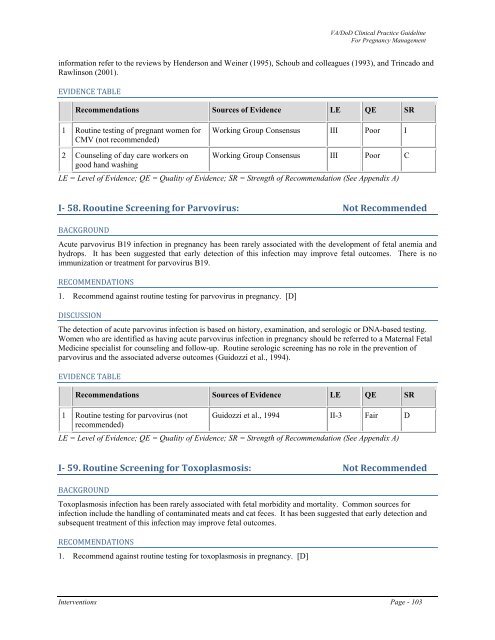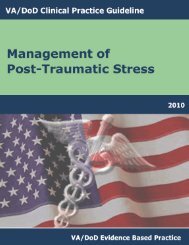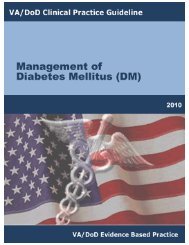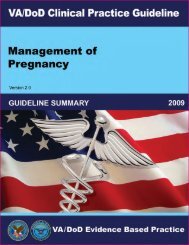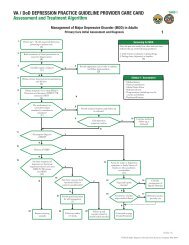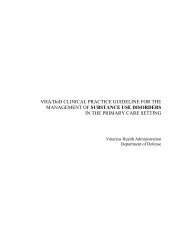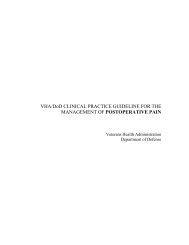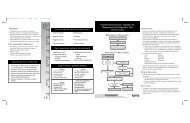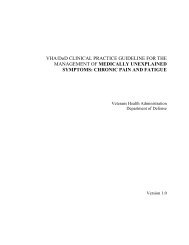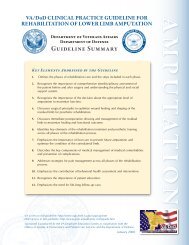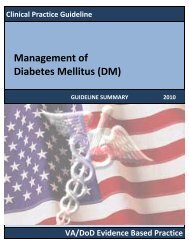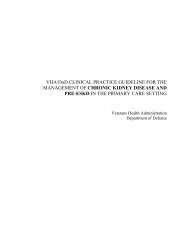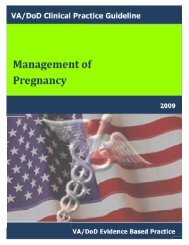Management of pregnancy - VA/DoD Clinical Practice Guidelines ...
Management of pregnancy - VA/DoD Clinical Practice Guidelines ...
Management of pregnancy - VA/DoD Clinical Practice Guidelines ...
You also want an ePaper? Increase the reach of your titles
YUMPU automatically turns print PDFs into web optimized ePapers that Google loves.
<strong>VA</strong>/<strong>DoD</strong> <strong>Clinical</strong> <strong>Practice</strong> Guideline<br />
For Pregnancy <strong>Management</strong><br />
information refer to the reviews by Henderson and Weiner (1995), Schoub and colleagues (1993), and Trincado and<br />
Rawlinson (2001).<br />
EVIDENCE TABLE<br />
Recommendations Sources <strong>of</strong> Evidence LE QE SR<br />
1 Routine testing <strong>of</strong> pregnant women for<br />
CMV (not recommended)<br />
Working Group Consensus III Poor I<br />
2 Counseling <strong>of</strong> day care workers on Working Group Consensus III Poor C<br />
good hand washing<br />
LE = Level <strong>of</strong> Evidence; QE = Quality <strong>of</strong> Evidence; SR = Strength <strong>of</strong> Recommendation (See Appendix A)<br />
I 58. Rooutine Screening for Parvovirus: Not Recommended<br />
BACKGROUND<br />
Acute parvovirus B19 infection in <strong>pregnancy</strong> has been rarely associated with the development <strong>of</strong> fetal anemia and<br />
hydrops. It has been suggested that early detection <strong>of</strong> this infection may improve fetal outcomes. There is no<br />
immunization or treatment for parvovirus B19.<br />
RECOMMENDATIONS<br />
1. Recommend against routine testing for parvovirus in <strong>pregnancy</strong>. [D]<br />
DISCUSSION<br />
The detection <strong>of</strong> acute parvovirus infection is based on history, examination, and serologic or DNA-based testing.<br />
Women who are identified as having acute parvovirus infection in <strong>pregnancy</strong> should be referred to a Maternal Fetal<br />
Medicine specialist for counseling and follow-up. Routine serologic screening has no role in the prevention <strong>of</strong><br />
parvovirus and the associated adverse outcomes (Guidozzi et al., 1994).<br />
EVIDENCE TABLE<br />
Recommendations Sources <strong>of</strong> Evidence LE QE SR<br />
1 Routine testing for parvovirus (not Guidozzi et al., 1994 II-3 Fair D<br />
recommended)<br />
LE = Level <strong>of</strong> Evidence; QE = Quality <strong>of</strong> Evidence; SR = Strength <strong>of</strong> Recommendation (See Appendix A)<br />
I 59. Routine Screening for Toxoplasmosis: Not Recommended<br />
BACKGROUND<br />
Toxoplasmosis infection has been rarely associated with fetal morbidity and mortality. Common sources for<br />
infection include the handling <strong>of</strong> contaminated meats and cat feces. It has been suggested that early detection and<br />
subsequent treatment <strong>of</strong> this infection may improve fetal outcomes.<br />
RECOMMENDATIONS<br />
1. Recommend against routine testing for toxoplasmosis in <strong>pregnancy</strong>. [D]<br />
Interventions Page - 103


